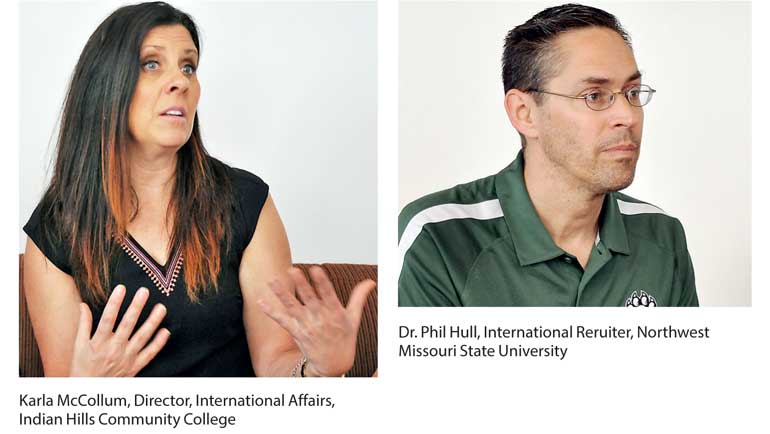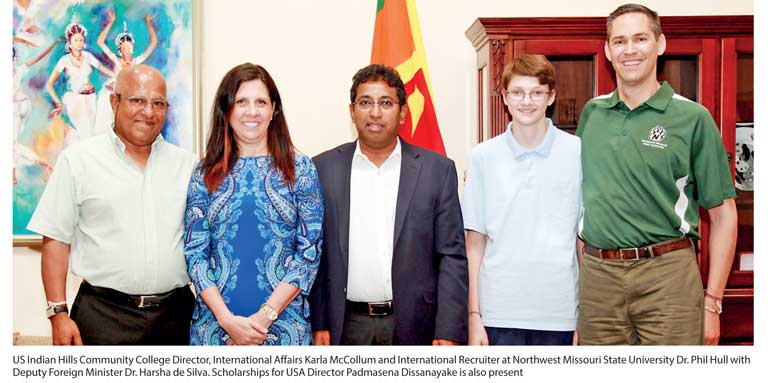Sunday Feb 22, 2026
Sunday Feb 22, 2026
Wednesday, 24 May 2017 00:00 - - {{hitsCtrl.values.hits}}
 By Asnah Anver
By Asnah Anver
When you think of higher education in the USA, affordable would probably not be the first word that comes to mind. However, when conversing with Karla McCollum, Dr. Phil Hull and Priyanthi Dissanayake many of these myths surrounding tertiary education in the USA were busted.
Karla McCollum is the Director, International Affairs at Indian Hills Community College, while Dr. Phil Hull is the International Recruiter at Northwest Missouri State University, both in the USA. They were in Sri Lanka on a visit organised by Scholarships for USA (SUSA), an initiative run by husband and wife duo Padmasena and Priyanthi Dissanayake. Amidst their tight schedules, Karla, Phil and Priyanthi sat down with the Daily FT to have a chat on scholarship opportunities, the relative benefits of community colleges and state universities for international students, and the importance of cultural diversity to break stereotypes.
SUSA was started in 2001, by Padmasena and Priyanthi, to connect local students to affordable education opportunities in public or private US schools. SUSA offers students one-on-one attention, and has sent students from across Sri Lanka, from towns ranging from Jaffna to Hambantota, including students from both local and international schools.
To ensure the quality, Priyanthi and Padmasena are very careful with the schools they represent, touring the USA extensively each summer, hand picking higher education institutions offering the lowest cost with the highest quality of education. Indian Hills Community College, ranked among the top 10% community colleges in the United States, is one such college that SUSA has identified and has been working with over the past three years. A community college located in the mid-western state of Iowa, Indian Hills has offered scholarships to 12 Sri Lankan students through SUSA, all of whom were ‘tremendous, high achieving, successful students who were very active on campus’, Karla informs.
As a community college, Indian Hills offers a two-year associate degree. This means that the college only teaches the first two years of the undergraduate level degree, after which the student can transfer to any university in the United States to complete the remainder two years of study (2+2 program).Because of the two-year duration and the college’s location in the mid-western region of the United States, students are able to get a low cost education at the same standard of any other US university. “We are accredited by the same accrediting agency so our classes meet the exact same standards,” Karla emphasises. An additional advantage is that students have an ‘optional practical training’ option, to work for one year full time before transferring to a university.
Because Indian Hills can guarantee scholarships only for the two year associate degree period, the college has forged partnerships with a number of universities, such as Northwest Missouri, to provide students good transfer options. Karla states that, “When we work with partners like Northwest Missouri, we work with them strategically. Our degree transfers to anywhere in the United States, but we want to make sure that when they do transfer they are offered scholarships.”
Karla who is very clearly invested in the students’ interests enthusiastically gives an update on the status of the Sri Lankan students. “Of our SL students some have come back home. Some have transferred on… One of our students who came through SUSA is taking advantage of the optional practical training – gone on to work at Wells Fargo, one of the top companies in the United States for one year.”
In order to provide local students and parents the complete picture of how two years of community college and two years of university functions, Karla invited Phil, representing Northwest Missouri State University, a trusted partner of Indian Hills on this visit.
Northwest Missouri State University is a public university assisted by the mid-western state of Missouri. The University first began as a teacher’s college but now offers both bachelor’s and master’s degrees in a range of subjects. Of the university’s 7,000-strong student population, 10% are international students.
Phil notes that what sets Northwest Missouri apart from other universities is the competitive scholarship program it offers, which reduces the cost of education considerably. The university offers both merit scholarship awards and discounted tuition fee rates for both students coming from community colleges, and international and domestic students enrolling directly. Northwest Missouri, which has developed its partnership with SUSA only very recently, does not have any Sri Lankan students enrolled currently.
Phil states that many students are not familiar with the mid-western region of the United States for higher education. He notes that when people think of higher education in the USA certain cities (such as California, New York, Boston, Washington, etc.) and the Ivy League schools in these regions stand out. However in actuality ‘the majority of US students and the majority of international students go to community colleges, state institutions, much smaller private schools’. In fact the state of Missouri ranks number 12 in the United States in terms of welcoming international students to study at the collegiate level.
For Karla one of the biggest challenges is to spread awareness and understanding of the community college system, which is not as well known as the university system. Karla informs that community colleges are now the most popular method of acquiring a university education in the USA, with 50-51% of university students in the USA having attended a community college first.
Both Indian Hills and Northwest Missouri are located in small towns. Karla emphasises the safety of these localities. “What we see in the news is not the reality of the America we live in. It is a very safe, welcoming and hospitable part of the country.” In fact Maryville, the town in which Northwest Missouri is located, has been voted as the 28th safest university town in the United States in 2016 by a company called Safewise.
Although there is a perception that an education in USA is expensive, Priyanthi notes that what she has found through her own daughter’s experience is that because of the generous scholarships offered by US universities, the final cost that the student has to bear in comparison to other countries is much less. Priyanthi says that she is a passionate advocate of US higher education ‘because of the generosity and the experience the children gain to be world class citizens’
Karla and Phil had visited Lyceum International School in Nuwara Eliya, Gateway International School in Kandy and the British School in Colombo, to spread awareness on the scholarship opportunities available and address the general bias against community colleges. The present visit was also to enrich partnerships and ‘start the dialogue’ for future opportunities such as short term study abroad programmes for USA students and faculty exchange.
Karla is effusive in her praise of Sri Lanka, but most importantly says the visit has provided her with a better understanding on some of the challenges and cultural differences that Sri Lankan students coming to the USA might face. Phil agrees with this and adds that, “One of the things I enjoy about going to other places…is that it helps to break down those stereotypes that we have of places…even though a lot of what we do when we travel is work related. A lot of it does have a personal impact on us.”
For Phil, his encounter with Sri Lanka began as a small child in Los Angeles. He fondly recalled a Sri Lankan man his father helped by co-signing a loan, who would visit every Christmas with a green box of Ceylon tea. Phil states that this encounter at a young age of a very different looking stranger being welcomed at his household, made an impression on him as a child. So for Phil this visit has both the professional and personal dimensions to it.
Karla and Phil both emphasise the importance of bringing students from diverse backgrounds and cultures together to shatter stereotypes and enrich the classroom experience. Karla recalls the story of an African American boy from St. Louise who shared a room with a SUSA student from Sri Lanka. The two would soon become best of friends and when the Sri Lankan student graduated from Indian Hills, unbeknownst to him, the boy from St. Louise sent an email to the Sri Lankan student’s father thanking him for allowing his son to study at Indian Hills because of the impact it has had on his life. Karla states, “That to me is why I get up every single morning and do what I do; because we can make change one person at a time. So when government, politicians, the news media is in the way…we can have a better understanding through international education. That’s why it is not only important that Sri Lankans come to America, but that Americans come to Sri Lanka. That is why it was important for us to come here and see what else we can do.”
Phil also adds that, “Each student coming from their home country is an ambassador. They certainly have something to gain from being on their own, studying in a different country and absorbing a different culture. But like Karla’s story suggest that there is so much that they have to teach other people.”
-Pix by Lasantha Kumara